|
Vidas: Hi guys, this is Vidas!
Ausra: And Ausra! V: Let’s start episode 535 of Secrets of Organ Playing Podcast. This question was sent by James, and he writes: “Thank you for your podcast, it has been a great help. I have played the piano for 25 years and the organ at my church for 17, but was only able to take organ lessons for the first 2 years, the rest has been essentially self-taught. Your podcasts have been very informative. 1. my dream for organ playing: I know I will never be a concert organist, but I would like to be able to really make my church organ sound great, and select unique registrations throughout the Mass. 2. The 3 most important things holding me back: a. over the years, I have basically settled for just a handful of different basic registrations for hymns, etc. without much variety b. my church has a relatively small, 22-rank, 2-manual Zimmer pipe organ, installed in 1999, which is almost completely enclosed inside an alcove, and doesn't "sing" very well. The church is the size of a cathedral, but I'm afraid the organ is too small for the space. c. I have never had formal instruction in the theory of organ registration, other than what I have learned on my own. I know the basics of building a principal chorus, understanding overtones and harmonics, etc., but my registrations are still very "boring" in my opinion. Again, thank you for your podcast and teaching, and I look forward to any advice you can give me. -James” V: So, Ausra, James has a problem with registration. He wants to make his organ sound great, and his registrations to be unique, so to say. A: Well, don’t we all want to do something beautiful, and to register nicely. But the problem is that I think that when you are asking about registrations and about how to register a certain piece, or in general how to select the best registration, actually, you need to give us the specification list of your organ. Because otherwise, you know, we might be talking about different things, because it’s sort of hard to suggest something without seeing the actual stops. And even when having the list of stops, you still might need to adjust something, because you really need to listen to the organ in the real situation. But, I guess if his church is the size of a cathedral and he has only 22 stops, it might be too small for such a room. Another thing, you know, when you register, you also need to think about reverberation—if the room is reverberate or not. It also means a lot. But I thought about his asking how to increase sound of the organ, so basically what you could do, either to add the manual couplers, or in some cases, you would probably need to play things an octave lower. That also might help sometimes, because, for example, we have so many organs built in Orgelbewegung style, that have these screamy, ugly, sound mixtures… not all of them, of course, but most of them actually have them. So it sounds nice when you play things an octave lower when it has more of a sort of a round and nice sound. V: Yeah, I’m not sure if this applies to him, because we don’t know the specification. We don’t even know the composition of the mixture—if it’s a low mixture or if it’s a high mixture. But in general, what he can do is to thicken the texture a little bit. Play with… I don’t know how his organ technique is—well advanced or not—but he could play in more than four-part texture. More parts per chord. Right? Is that necessary? A: That’s a possibility, but it doesn’t always work. But, you know, he thinks that he sort of registers pieces the same all the time, like hymns. But I think it’s not a bad idea. You know? Because, I think when you are working as a church organist, you develop some sort of routine, and this is good. Maybe you don’t want to experiment every time, and you need to be ready in advance. But of course, what you could do, and we have talked about it, actually in our previous podcasts, that you could project, let’s say, the Cantus firmus, on one manual, and play other voices on another manual. And your Cantus firmus could be either in the Soprano, as most hymns are written, but you could also play it in the tenor voice, and even in the bass sometimes works, too. That would be also a possibility to do something different. V: Yes, not only his registration should change, but maybe the manner of playing! A: True. V: Spice things up. Make it more colorful and interesting. Maybe add some non-chordal notes, like passing tones and neighbor tones, suspensions, re-harmonize. A: Yes! V: I don’t know if he has some skill in that or not, but that could certainly be a possibility, and a 22 rank 2 manual organ might sound like eight stops per manual plus additional stops in the pedals. So, if you have something like 8 stops in the manual, this could be something like 8’ Principal, 8’ Flute, maybe a Gamba, maybe 4’ Principal like Octave, maybe a 4’ Flute, then maybe a 2’ Principal, probably (a Super Octave), Mixture, and a Trumpet, probably. What else… maybe instead of a string stop, he might have a fifth stop (2 2/3’) instead of that on the first manual. I’m just guessing, of course. A: Yes, this is just a hypothetical thought, because we don’t see the specification lists. What else could he do, because he wants to find new registrations? Sometimes you might use only 4’ Flute alone in some soft interludes, for example. It works nicely if you have some sort of canzona-like piece, which is a little bit polyphonic, and it has a joyful character—a joyful, sweet character. You might try the 4’ flute alone. V: Or 4’ Principal. A: Yes. Or sometimes 4’ and 2’ stops, if they are soft enough—if the 2’ is not too screamy. V: If it has a Trumpet, you could play the harmony with the Trumpet, as well, in a festive situation. A: Yes. V: Or, if you have a Cantus firmus in the soprano, you could solo it out, take it on another manual with a reed stop, or a Cornet stop would work on the second manual, for example, in general, taking it on two manuals, not on one, gives more colorful options. Then, of course, your solo stop could be played in the tenor range, with the left hand. A: That’s right. And we don’t know if he has a 16’ stop on the manual, but if he does, he might play some music also on two manuals, and he could accompany with his left hand, with the 16’ and 8’, and then add some higher pitched stops on the other manual for solo voice. V: Or even re-harmonize the four voices or three voices, soprano alto and bass, and play the pedal with the reed, if he has an 8’ Trumpet, and in the tenor range, not in the base range. A: And in general, if he has some assistance, it would be really nice if he could go to listen to his organ from the side. V: Record himself. A: Or yes, if he doesn’t have help, he might record himself, and to listen to those various combinations, and then he might decide what works, and what does not, and in general, if he has a big hall during Mass, for example, then of course, he needs to consider that he needs to use more stops than if playing in church alone, because people will just eat up the sound. V: Right. He doesn’t say that he wants to be a concert organist, but it doesn’t hurt to play pieces that could be supplemental to the liturgy in addition. That could be part of the concert repertoire, but that could be liturgical chorales, or chorale preludes. And with these, you could experiment with even more colorful registrations. A: That’s right. So, I think that a 22 rank instrument is fairly enough for experiments. V: Yes. Hopefully, he can take advantage of this, and share his music with the congregation, and hopefully get feedback—nice feedback. A: I know, but also, you don’t have to do experiments like play with mixture stops alone. That definitely wouldn’t work. V: No. People hearing it will scream. A: So, I guess the organ in general is quite a conservative instrument, so you need to apply certain rules, and not experiment too much. V: Alright guys! This was Vidas, A: And Ausra, V: Please send us more of your questions; we love helping you grow. And remember: When you practice, A: Miracles happen.
Comments
Thank you everyone for participating! You all made us very happy with your entries. We have all selected the following winners.
Have you ever wanted to start to practice on the organ but found yourself sidetracked after a few days? Apparently your inner motivation wasn't enough.
I know how you feel. I also was stuck many times. What helped me was to find some external motivation as well. In order for you to advance your organ playing skills and help you motivate to practice, my wife Ausra - @laputis and I invite you to join in a contest to submit your organ music and win some Steem. Are you an experienced organist? You can participate easily. Are you a beginner? No problem. This contest is open to every organ music loving Steemian. Here are the rules
Welcome to Secrets of Organ Playing Podcast 545!
Today's guest is Daniel Moult who is Head of Organ Studies at the Royal Birmingham Conservatoire and international concert artist, is “one of the finest organists of our time” (The Organ). Renowned for his virtuosic, intelligent and engaging performances, his musicianship has been praised as “exhilarating” (Gramophone), “dazzling” (The Organ), and “formidable” (Organists’ Review). Daniel’s innovative approach to the promotion of organ music has seen him presenting and performing in the DVDs Virtuoso! Music for Organ, a film featuring some of the most demanding organ repertoire of the twentieth-century, and The Elusive English Organ, a journey through English organ music from Byrd to Wesley. He is currently filming The English Organ, a major DVD and CD boxset covering music and organs from Handelian times to the present day. He has made several CDs, including the first solo recording of the newly-restored organ of Arundel Cathedral, and one of Handel's organ concerti and other pieces on the Signum Classics’ releases, Handel at Vauxhall. As a soloist, Daniel has performed in the UK, Europe, Asia and Australia. Upcoming appearances include major venues and festivals in the UK, as well as concerts celebrating Handel with the London Early Opera Orchestra, and concerti appearances in Germany. He has been Artist in Residence at Sydney Grammar School and is due to record in Australia and New Zealand in 2018/19. Based in London, Daniel was born in Manchester and studied at Oxford University and Amsterdam Conservatorium. At Birmingham, he heads the highly-acclaimed organ department in a new £57 million building. He teaches and leads masterclasses, workshops and courses around the world. Daniel has published several editions, including the Easy Bach Album and the Easy Handel Album for Bärenreiter. He broadcasts frequently on BBC television and radio and has recorded for various record labels including Fugue State, Signum and Sony BMG. Today with Daniel we are talking about what it takes to be an ambassador of an English organ. I was delighted to know that we have a common friend - James Flores from Australia. Listen to the conversation Relevant link: www.danielmoult.com Would you like to learn Andantino in F# Minor 2 from L'Organiste by Cesar Franck? I hope you'll enjoy playing this piece yourself from my PDF score which will save you many hours of work and help you practice efficiently. Thanks to Jan Pennell for her meticulous transcription from the slow motion video. What will you get? PDF score with complete fingering written in. Basic Level. 1 page. Let me know how your practice goes. This score is free for Total Organist students. Check it out here Would you like to learn "Nun komm, der Heiden Heiland", BWV 661 by J.S. Bach? I hope you'll enjoy playing this piece yourself from my PDF score. Thanks to Jeremy Owens for his meticulous transcription from the slow motion video. What will you get? PDF score with complete fingering written in which will save you many hours of work. Intermediate level. 3.5 pages. Let me know how your practice goes. This score is free for Total Organist students. Check it out here SOPP532: In recent years I had to give up organ playing in public because of my physical health12/26/2019
Vidas: Hi guys, this is Vidas!
Ausra: And Ausra! V: Let’s start episode 532 of Secrets of Organ Playing Podcast. This question was sent by Maureen, and she writes: “Dear Vidas, I am a graduate from the Guildhall School of Music and Drama, London which was for piano playing.. I have never sat any organ exams nor played music for the organ at that level. My foot work was not at such a high standard. In recent years I had to give up playing in public because of my physical health. I have a condition called Fibromyalgia which is a painful and debilitating one. Playing the organ was my first love and made my debut in my hometown when I was only 13 years old. I played at a Sunday evening service in the Protestant Church of Scotland and later asked to deputise for my music teacher who was the church organist. Good organists were scarce as was money so choices had to be made as to the disciplines which would be most beneficial to me. I chose piano, singing and cello. Organ was almost an extension to the piano lessons. I loved playing in Church for all the various Sunday services and for Mass. Hymns were particularly important to me and practised diligently each day before I started my teaching. Voluntaries were also played daily in preparation for services. Funeral music was always being worked on and it was my delight in investing in a variety of suitable music. Weddings over the years have dwindled as many people do not favour the sacrament of holy matrimony as once they did in my teenage years. I can have access to a small organ in the nearby monastery of Pluscarden Abbey, Elgin Moray where there is a healthy community of Benedictine monks. They sing plainchant which I love doing when I attend Sunday Mass there each week. I have no transport to attend daily Mass when I could be staying on to play the organ. The nearest I get to practising an organ is on my own personal Klavinova which I can attempt to mimic a near enough pleasant enough sound for the organ. I would like to think that I was more than competent as a regular organist who accompanied Church services. To put a grade on it would be one for my hands and a different level for my feet I think... Thank you for reading this account.” V: And she continues writing later: “The most important fact which I failed to tell you about was the loss of use in my right hand and arm. My hand wouldn’t open out without pain and tightness in the palm of my hand. Pain went through the whole of my arm constantly for five years! Over time and with acupuncture my hand and arm became pain free. Nothing showed in x-rays and nerve tests. What I still find is a reduced dexterity in my hand. The muscles are strong there was no damage to be found only excruciating pain. I would appreciate your advice on which type of exercise I could do daily. Hanson for piano is my mainstay at present. Thank you, Maureen” V: First of all, I’m not familiar with Hanson, maybe she means Hanon. Could be. A: Could be… V: I don’t know. To summarize her situation, I think she had this Fibromyalgia, and the remaining result is that her muscles are not… the fingers are not fast enough on her right hand. Did you understand the same way? A: Yes, that’s what I understood, too. V: So, right exercises, probably, should be done with more care than left hand exercises. A: That’s right. I would suggest for her to take supplements of vitamin B. It’s crucial for muscles, too, and I think that in order to strengthen those muscles, maybe she needs to strengthen other muscles as well, because everything in our body is connected in between, so I guess the physical exercise in general is a good idea. V: If she has no pain in her knees and legs, maybe she can walk—start walking. A: Yes, and you know, when we actually play on the organ or any other keyboard instrument, we need to think about that not our hand is doing it alone, but actually that we have a long arm, which is connected to our back, and actually that our back is even more important than our hands, because the back supports the entire arm! V: In this case, you mean that the hands are an extension of the back. A: True. V: And we have to play with feeling even the back muscles. A: True, and sometimes if you have a muscle problem in your hand, it might mean that something is wrong in your back. So my suggestion would be probably to do some Pilates. V: Pilates. A: Yes. V: Yes, Pilates would be good. It’s moderate intensity exercise, not to be very dangerous, and see how she feels. A: Because you know, if you will do only manual exercises, playing, let’s say, scales or arpeggios or something, and you will play extremely a lot of them, you might hurt yourself. V: Yes. I think with organ playing at this time, she should be moderate. Take moderation into account and not to extend herself, and maybe take care of her general health issues more carefully, and just slowly build up her technique, not expecting results overnight, or over a week, or over a month. Just her goal has to be, I think, just keep practicing, and stopping, probably, before she gets tired, not to hurt herself—not to feel exhausted—and to rest for a while and then playing some more if she wants. A: Yes, and you know, this Fibromyalgia is sort of a very mysterious disease. I read about it, but I still could not understand it, and I don’t think that doctors can, either. V: Okay, guys, please send us more of your questions; we love helping you grow. And remember: when you practice, A: Miracles happen! Dear friends of Secrets of Organ Playing community!
Merry Christmas! We hope you are having a wonderful time with your loved ones. We hope that you bring joy with you wherever you go and that there is plenty of food around the Christmas table. And when the festive noise calms down you will play some of your favorite Christmas organ music. Or even better, play it for your friends and family! The season is an excellent time to turn a new page in your organ playing journey. That's why we are offering Total Organist Christmas 50% discount. Every score and training program in our Secrets of Organ Playing Store is 50% off too. This offer is valid until January 1st. And remember, when you practice, miracles happen! Vidas and Ausra Last Thursday when I went to the church, the first thing I did was to improvise on the Icelandic fairy tale about the Stone of Dverg. The tale tells a story about a dwarf who hated a farmer living nearby and tried to carry a large stone and cast it on his house. But the stone was too heavy and it fell before it reached the house of the farmer. What happened was that security guard had it ready for us in his pocket but had been called shortly before we arrived to the parking lot. We waited for him for a few minutes and a nun actually called him about the key. The rehearsal went fine except for the fact that the F1 key kept sticking on the Great. It was very annoying. Tried hitting it softly and strongly but the results were unpredictable. So when there were 30 minutes left before the recital I climbed to the windchest, took out the F spring, widened it and put it back inside. Now this key required more energy to press but at least the stickiness disappeared. I set up the camera phone from the right hand side when looking at the organ. We noticed that the spotlight from the opposite column didn't work so I pointed the remaining one to the middle of the organ. I checked the mic connection to the phone and turned on the recorder on Ausra's phone too as a backup. I started livestreaming to Facebook from my phone 1 minute before 6 PM. The church was full of people and we were ready to start. Oh and by the way, I started drawing a comic from the scene in our rehearsal when Ausra practiced her "Nun komm". It was about Pinky asking Spiky to lower the bench while she was playing the chorale prelude. Spiky was eager to help and tried to pull the wooden blocks underneath Pinky. Have to finish the drawing and coloring it later. So anyway, we started our recital with the Sinfonia, BWV 248/10 from Christmas Oratorio. At first I was a little nervous and even didn't help Ausra to relax but when we finished our first piece I understood we will be fine. Ausra got her first acquaintance with that F Key on the 1st manual which was now much more difficult to press. We played on the P8 stop on the Great and the bass part on the Positive with F16 and P8. The second piece on the program was the choral "Brich an, o schones Morgenlicht", BWV 248/12. Here the only accident occurred in Ausra's part in the penultimate phrase. A couple of alto notes got mixed up. The registration was P16, 8, 4 and 2 of the Great. The 3rd piece was aria "Frohe Hirten, eilt ach eilet", BWV 248/15. It had a notorious difficult passage for tenor towards the second half. I did fine. The registration was F8, 4 in the Soprano (Great), F8 and Oboe in the tenor (Swell) and F16, 4, P8 in the Bass (Positive). The 4th piece was the choral "Schaut hin, dort lieft im finstern Stall", BWV 248/17. The registration was P8, 4, 2 and F16 on the Positive. I always forget whether to look at the piano reduction or the SATB score before we start. Today was no an exception. Then we played aria "Schlafe, mein Liebster", BWV 248/19. The registration was Gamba and two flutes on the Positive, alto part - on the Great with F8, Salicional 8, F 4 and Unda Maris and the bass part with P8 and F16 on the Swell. What can I say? Well, I just wished we had played from the original full-length version and not from abridged arrangement because it sounded too beautiful. To end Christmas oratorio part of our program we played the choral "Wir singen dir", BWV 248/23 on the Principal chorus with mixture of the Great. We did a very nice ritardando at the end. Then Ausra played chorale prelude on "Nun komm, der Heiden Heiland", BWV 659. The registration was Cornet for soprano on the Swell, F8 and Salicional 8 for the alto and tenor on the Great and P16 and 8 for the bass. During her playing I thought that it brought so much calmness and peace for me that I felt like she was playing it for me only. I was right - she even emphasized the cross sign at the end. Now came my turn to play solo. I raised the bench while Ausra set up the registration for "Nun komm", BWV 660. Right hand - Gamba, P8, and two flutes on the Positive, left hand - P16, F8 and 4 and pedals F16, 8 and 4. To my surprise, I played it very well, even though had problems with it in almost every practice. Yes, even right before the recital today. I got lucky. That's all I can say. After this, I played "Nun komm", BWV 661 with full principal chorus and mixture with a third on the Great and everything up to a Posaune in the pedals. Didn't use the 32' Subbass because the air supply for some notes of the Posaune was insufficient. Again, I played fine and even was relaxed enough to add a spontaneous flourish in the soprano part with 16th notes in the last page. No. 10 on our program was chorus "Wachet auf, ruft uns die Stimme", BWV 140/1 for which I made a special organ duet arrangement. Ausra played on 2 manuals: P8 and 4 for the right hand on the Great and P8, 4, 2 for the left hand part on the Positive. I also played on the 1st manual but added solo Cornet and Trompette 8' for choral tune on the Swell. I also took the pedal part with 16', 8' and 4' foundation stops. To tell you the truth, it was the most technically demanding piece on the menu and we played it so well. Prior to the recital I had also used Clairon 4' for the choral line but decided to omit it because one note was out of tune. Listening to the recording afterwards we came to the conclusion it was for the best. No. 11 was Ausra's "Wachet auf", BWV 645 which she played with the P8 on the Positive, Octave 4 plus Trompette 8' on the Great and P16 and 8 on the Pedals. She again showed her calm nerves and played in a very relaxed manner. No. 12 was the duet "Mein Freund ist mein", BWV 140/6. We registered it for F8 and Vox Humana for the duet parts on the Positive, F8, 4, P8 and Q3 on the Swell and P16 and 8 on the Great. Ausra mentioned it afterwards that we've got to add it as an encore to the program in Orebro, Sweden on February 9 and Schwabisch Gmund, Germany in July 31, 2020. So I guess it means we played it well. Here comes the moment we've both been waiting for - the final choral "Gloria sei dir gesungen", BWV 140/7. We registered it on a full principal chorus with mixture and a thirds on the Great. Ausra played the soprano part and the bass part pedals (registered with Posaune). I took the alto and tenor parts with my left hand on the Great and doubled the soprano part on the Swell with Cornet. The loud applause downstairs right after the last chord meant the audience followed the program intently. We took a bow and went to the side but had to come back for a second bow because our audience demanded it. Ausra and I congratulated each other and I turned off the camera. In the meantime Ausra has been talking to the friends and family. Some of them wanted to take a picture of the organ. Here's the video: We hope you'll also enjoy the video recording that our Unda Maris organ student Audre Dudeniene combined with my video. Let us know what you think. |
DON'T MISS A THING! FREE UPDATES BY EMAIL.Thank you!You have successfully joined our subscriber list.  Photo by Edgaras Kurauskas Photo by Edgaras Kurauskas
Authors
Drs. Vidas Pinkevicius and Ausra Motuzaite-Pinkeviciene Organists of Vilnius University , creators of Secrets of Organ Playing. Our Hauptwerk Setup:
Categories
All
Archives
July 2024
|
This site participates in the Amazon, Thomann and other affiliate programs, the proceeds of which keep it free for anyone to read.
Copyright © 2011-2024 by Vidas Pinkevicius and Ausra Motuzaite-Pinkeviciene.
Terms of Service and Privacy Policy
Copyright © 2011-2024 by Vidas Pinkevicius and Ausra Motuzaite-Pinkeviciene.
Terms of Service and Privacy Policy

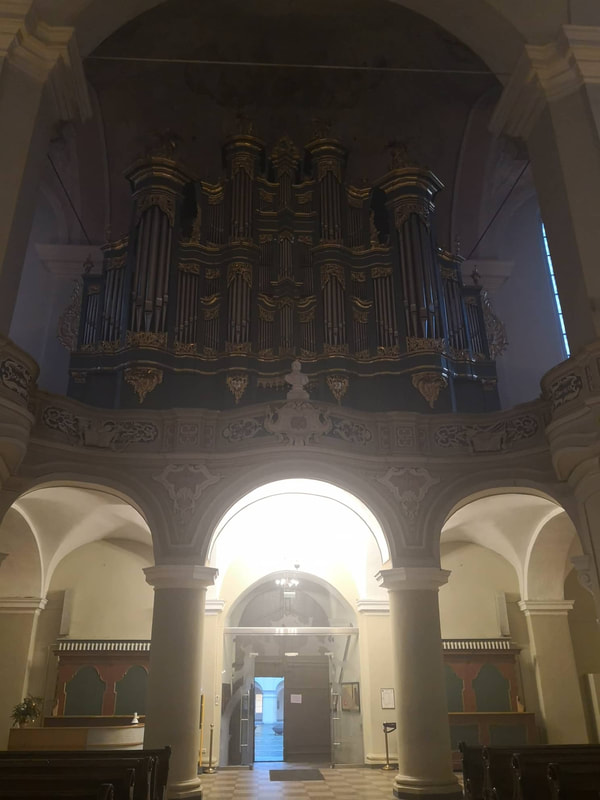
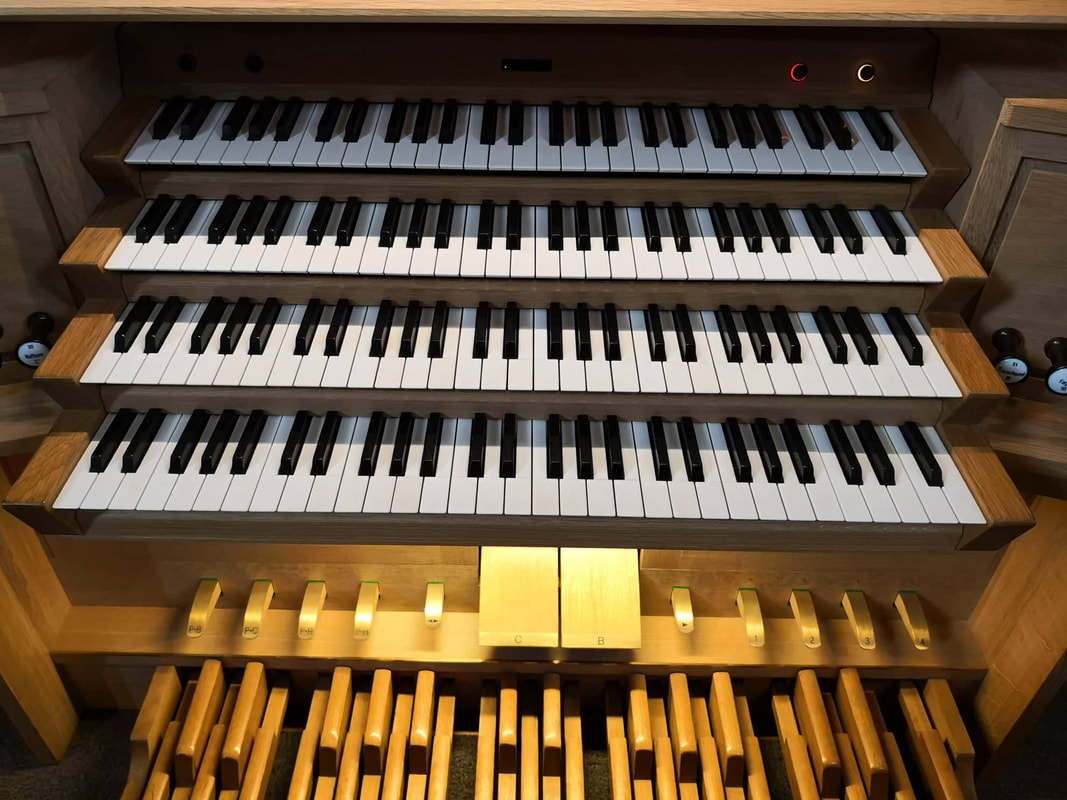
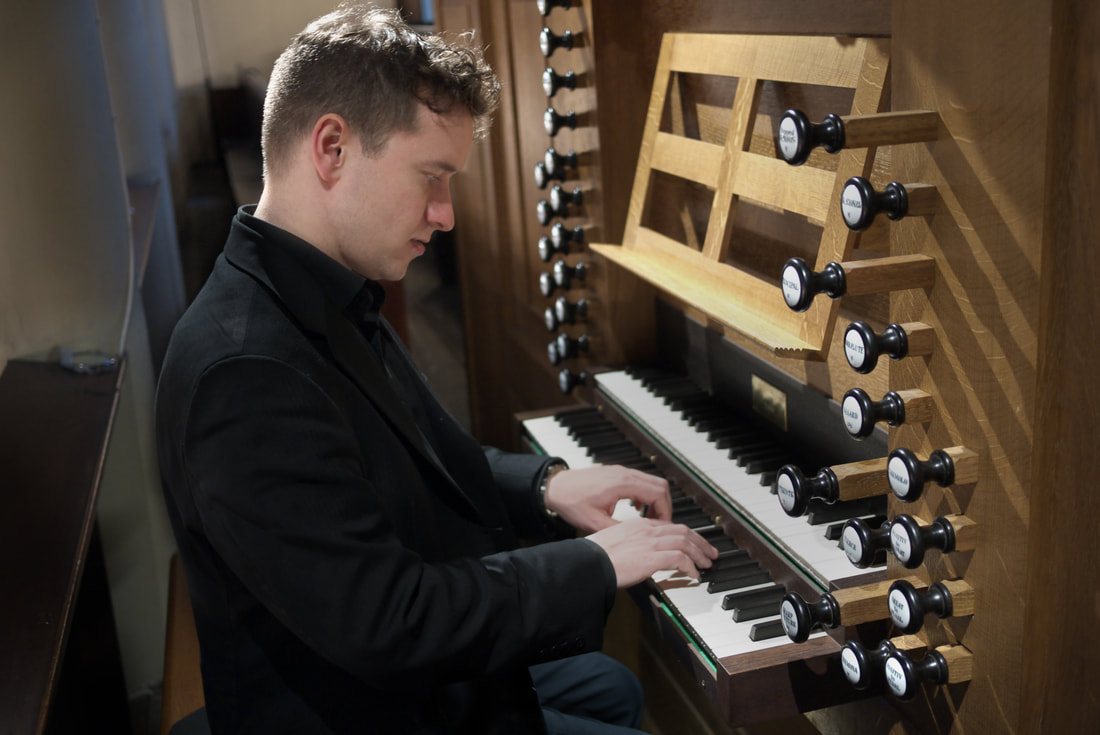
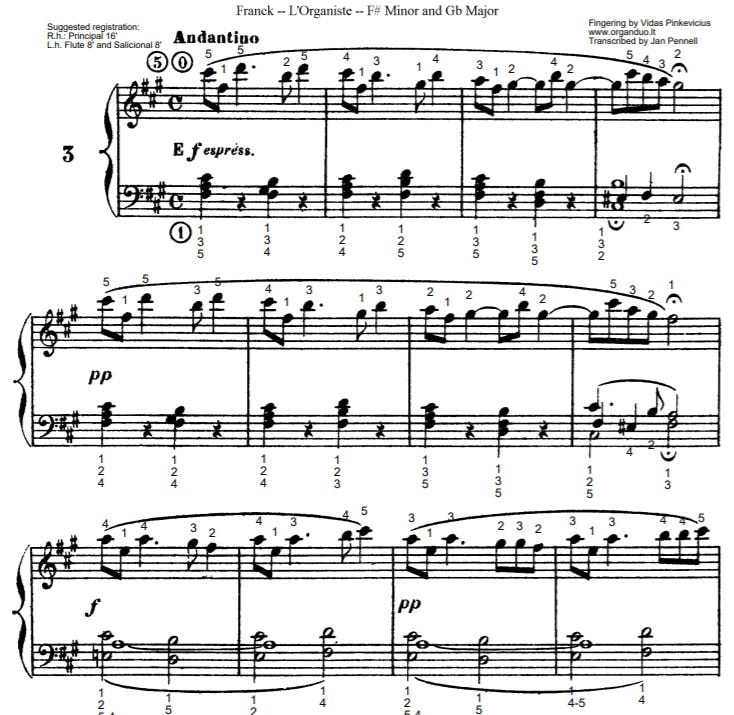
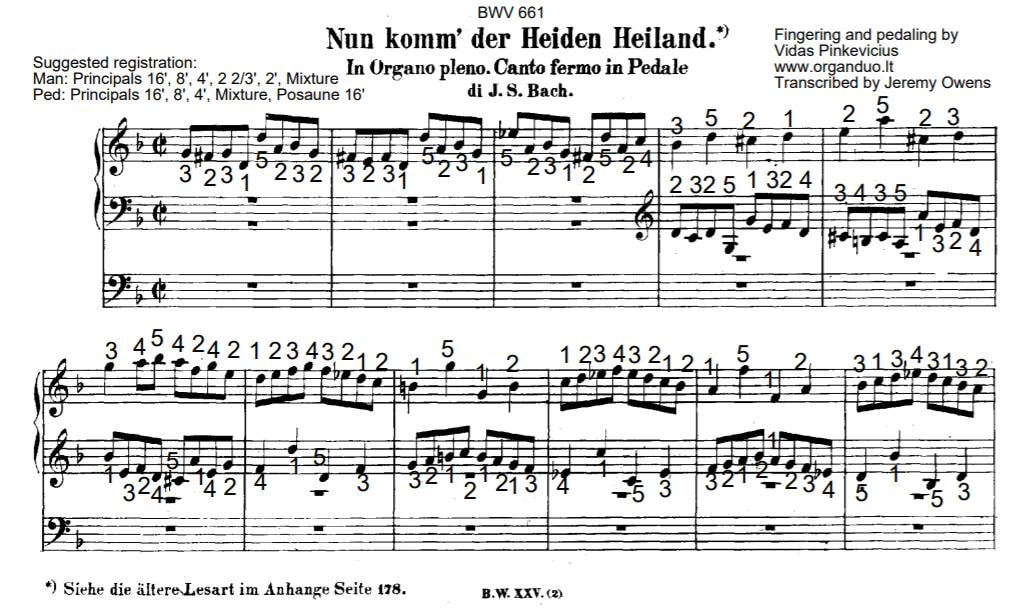
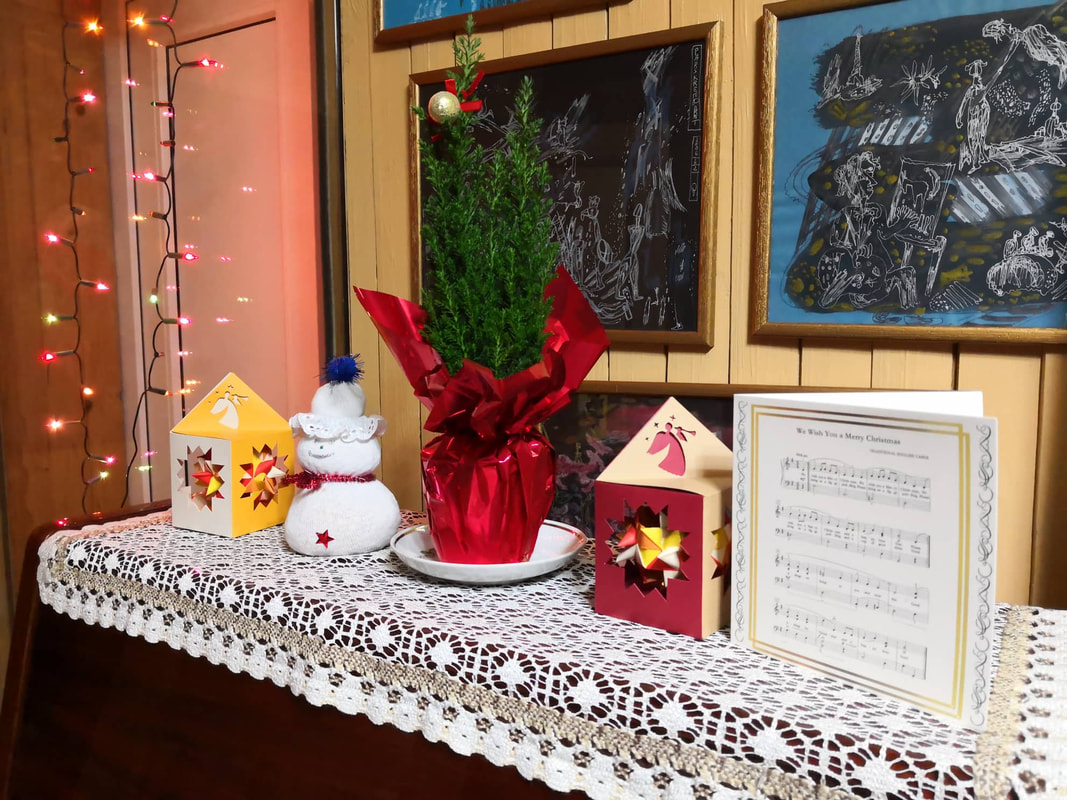
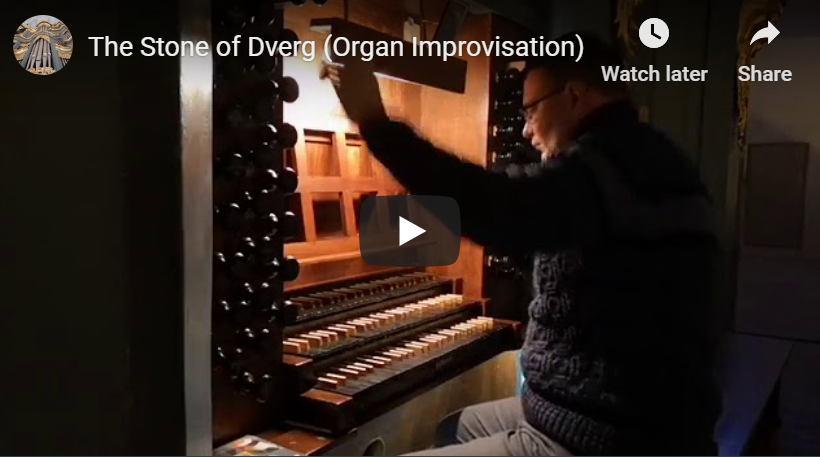




 RSS Feed
RSS Feed